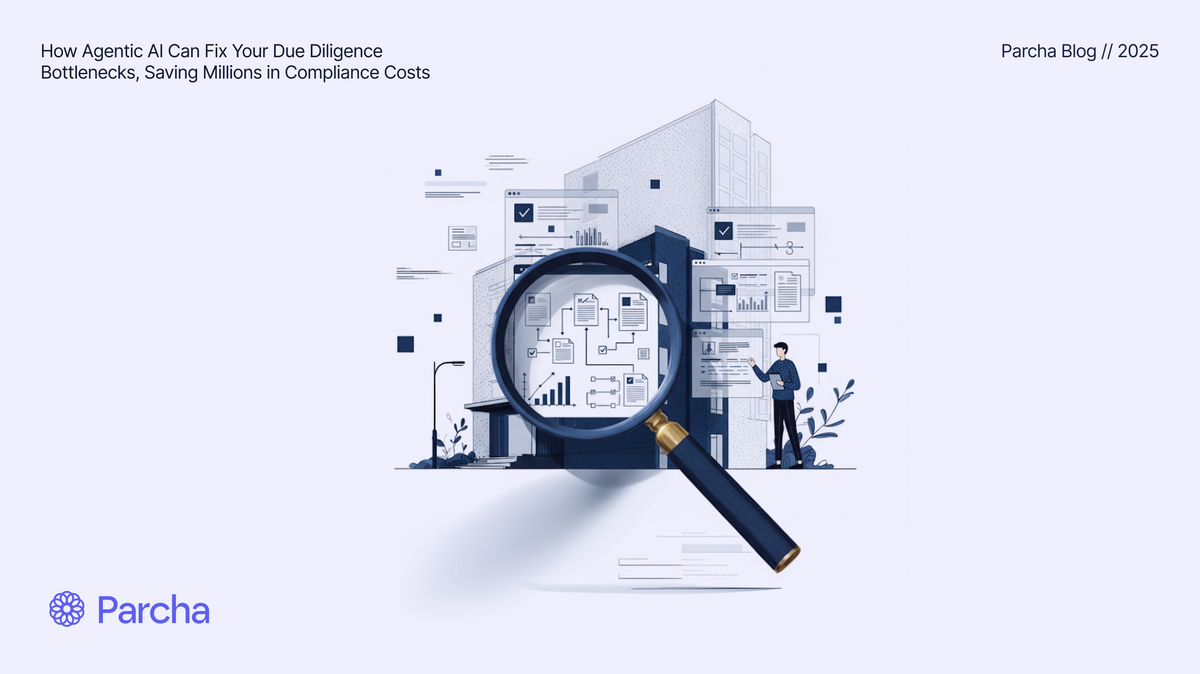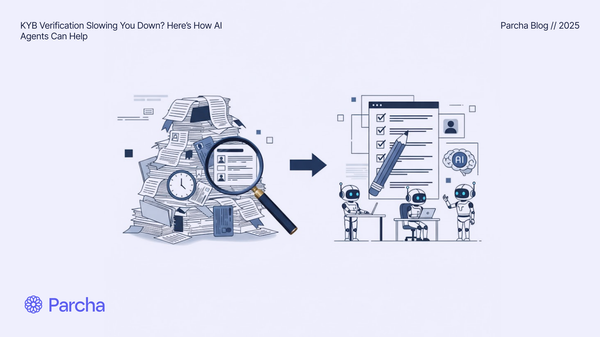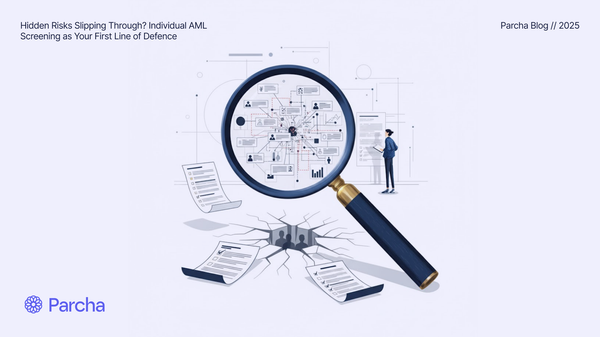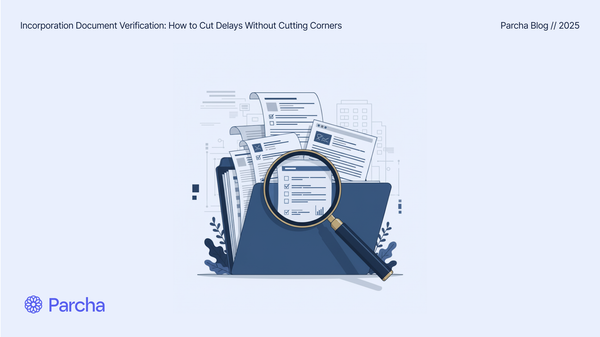How Agentic AI Can Fix Your Due Diligence Bottlenecks, Saving Millions in Compliance Costs

Are you tired of watching your team drown in mountains of documents, conflicting data, manual checks, and endless rework?
What if you had a digital “agent” that could sift through 10,000 pages, reconcile registries, highlight red flags, and surface evidence? What if it could do all of this in less than an hour?
Around the world, financial institutions now spend an estimated [$206 billion](https://risk.lexisnexis.com/global/en/about-us/press-room/press-release/20230926-global-financial-crime-compliance-costs#:~:text=The report offers,on Earth.) annually on compliance. And 98% of those institutions say compliance costs have risen in recent years.
If you can’t scale your due diligence operations today, you’ll never catch up tomorrow. This article will explore how AI agents can give you a competitive edge.
Why Traditional Due Diligence is Breaking
While your team drowns in paperwork, the real damage isn’t in the hours lost. It’s in the hidden drag on your compliance budget, your risk posture, and your ability to scale.
1. Data Deluge & Fragmentation
You face documents from registries, filings, sanctions lists, and media in multiple formats. Analysts waste hours reconciling mismatched names, addresses, and missing ownership data. Siloed systems force manual cross-checks, burying real risks under low-value work.
2. Headcount, Delays, and Regulatory Pressure
Scaling means hiring more analysts, but costs rise faster than output. Compliance now costs U.S. and Canadian institutions US $61 billion annually. Regulators expect zero lapses. In 2024, Commerzbank was fined €1.45 million for late refreshes – delayed updates of customer due diligence (CDD) or know-your-customer (KYC) records. Every delay costs revenue and raises risk.
3. The False Positive Tax
Legacy systems over-flag, and each false alert takes 5-15 minutes to clear. Since these false alerts accumulate, you’ve built a hidden “rework debt.” Analysts revisit earlier cases, chase clarifications, or reopen closed investigations. A false positive today can trigger duplicate work tomorrow. This hidden tax drains throughput and morale.
4. Manual Data Processing
Highly trained analysts spend their time copying data, verifying documents, and reconciling trivial issues instead of investigating real risks and edge cases. Burnout and attrition follow, with tribal knowledge lost when staff leave.
Traditional due diligence leaves you with two poor choices: add costly headcount or cut rigor and risk penalties. Neither scales.
Agentic AI can offer a third path.
Intelligent Automation for Faster Decisions
Unlike static rule engines, agentic AI runs autonomous, context-aware workflows that adapt to the complexity of each case. Instead of drowning in PDFs and registries, your digital agent can:
- Parse documents across formats
- Extract key data with accuracy
- Verify information against multiple trusted sources in minutes
- Generate citation trails so every decision is audit-ready
Your team still stays in control. Human-in-the-loop design ensures the AI agent escalates edge cases, highlights anomalies, and flags missing data. Instead of trying to replace analysts with black-box decisions.
Imagine onboarding a corporate client: the AI agent pulls shareholder records, reconciles names against sanctions lists, and cites sources. Your analyst can then review only the flagged discrepancies, not 200 pages of clean data.
The result is faster onboarding, reduced false positives, and higher confidence in your risk decisions. AI agents free your experts to focus on judgment calls, while the system handles the repetitive grind of compliance processes, at scale.
How AI Agents Supercharge Enhanced Due Diligence (EDD)
Agentic AI transforms enhanced due diligence, letting you focus on real risk instead of manual grunt work. Here’s how it helps:
- Accelerated Triage – The AI agent flags high-risk entities early, so your analysts can prioritize critical cases instead of wading through hundreds of low-risk files.
- Entity Resolution & UBO Discovery – Automatically reconciles company names, shareholders, and beneficial owners across multiple registries. Sanctions screening is continuous and precise.
- Adverse-Media Aggregation – Pulls news, regulatory filings, and social mentions, presenting context so you can distinguish true risks from noise.
- Contract-Level Risk Analysis – Scans agreements for clauses, obligations, or triggers that could pose financial, operational, or reputational exposure risk.
- Continuous Monitoring – Post-onboarding, the agent reassesses risk in real time, alerting your team to changes in ownership, sanctions, or public filings.
When onboarding a new corporate client, the AI agent will reconcile shareholder lists, check against sanctions, scan news for red flags, and highlight any contractual risks.
Your analysts need focus only on what matters: flagged issues, edge cases, and high-risk items. This cuts review time by [up to 70%](https://legal.thomsonreuters.com/en/insights/articles/how-ai-and-document-intelligence-are-changing-the-legal-tech-game?utm_source=chatgpt.com#:~:text=AI may reduce due diligence document review time by up to 70%25 on average while uncovering critical provisions across thousands of documents in minutes.) while keeping your compliance process audit-ready.
AI-driven EDD turns a slow, error-prone process into a proactive, high-confidence operation.
AI in Action: Streamlining Vendor Onboarding
Let’s say a mid-sized U.S. regional bank has a compliance team struggling to onboard 200-300 new vendors each quarter. Each profile requires cross-checking corporate registries, beneficial owners, sanctions lists, and adverse-media sources. Analysts spend an average of 6-8 hours per vendor, creating bottlenecks and increasing the risk of late-flagged issues.
By implementing an agentic AI solution for enhanced due diligence:
- Faster onboarding: Vendor profiles are triaged and reconciled in under an hour.
- Fewer false positives: The AI agent filters low-risk alerts, letting analysts focus only on high-risk vendors.
- Expanded regulatory coverage: Data from multiple global registries, news sources, and regulatory filings is automatically aggregated. Far beyond what analysts could have tracked manually.
- Significant cost savings: Reduced overtime and lower headcount needs, helping cut compliance costs by hundreds of thousands.
How to Deploy AI Agents Safely
By now, you understand that deploying AI agents for due diligence means balancing speed with security and responsibility. Here’s how to get it right:
- Start Small with a PilotBegin with a narrow, well-defined use case. A pilot allows you to test workflows, validate data accuracy, and measure efficiency gains without disrupting your full compliance operation.
- Enforce Data Security & Privacy ControlsEnsure AI agents have access only to the data they need. Implement encryption, access controls, and compliance with regulations like GDPR or CCPA. Protecting sensitive client and corporate data is non-negotiable.
- Integrate Seamlessly with Your SystemsConnect the AI agent to your CRM, GRC, ERP, and document management systems. Smooth integration ensures data flows automatically, reducing manual handling and avoiding process bottlenecks.
- Maintain Auditable Trails & ExplainabilityEvery decision the AI agent makes should be traceable. Ensure it produces clear, auditable trails, so analysts can explain and defend risk decisions during internal or regulatory reviews.
- Establish Feedback Loops and Continuous TrainingAI agents improve over time. Incorporate analyst feedback, monitor performance, and update models regularly. Version control and ongoing training can help prevent drift, maintain high accuracy.
- Scale with GovernanceOnce validated, expand the AI agent’s scope step by step. Put policies in place for model risk management, oversight, and compliance. This ensures your operations stay reliable as you scale.
When implemented thoughtfully, AI agents can accelerate due diligence, reduce errors, and free your team to focus on complex, high-risk cases. To see how these principles work in action, you can explore Parcha’s AI agents for enhanced due diligence.





